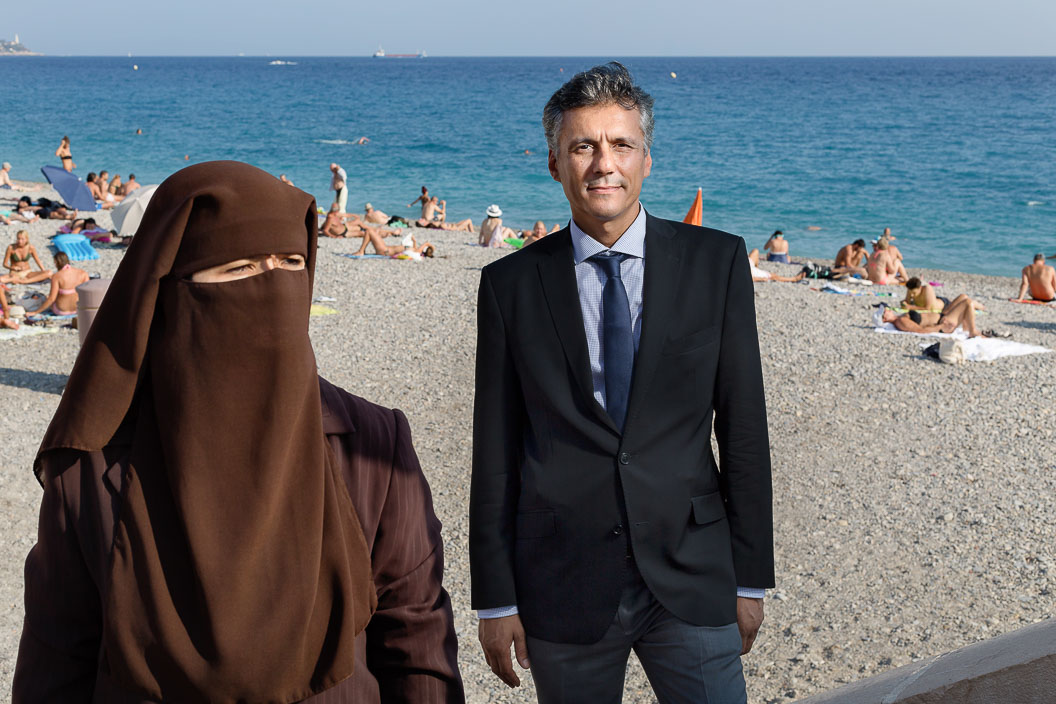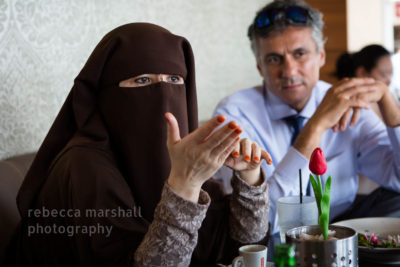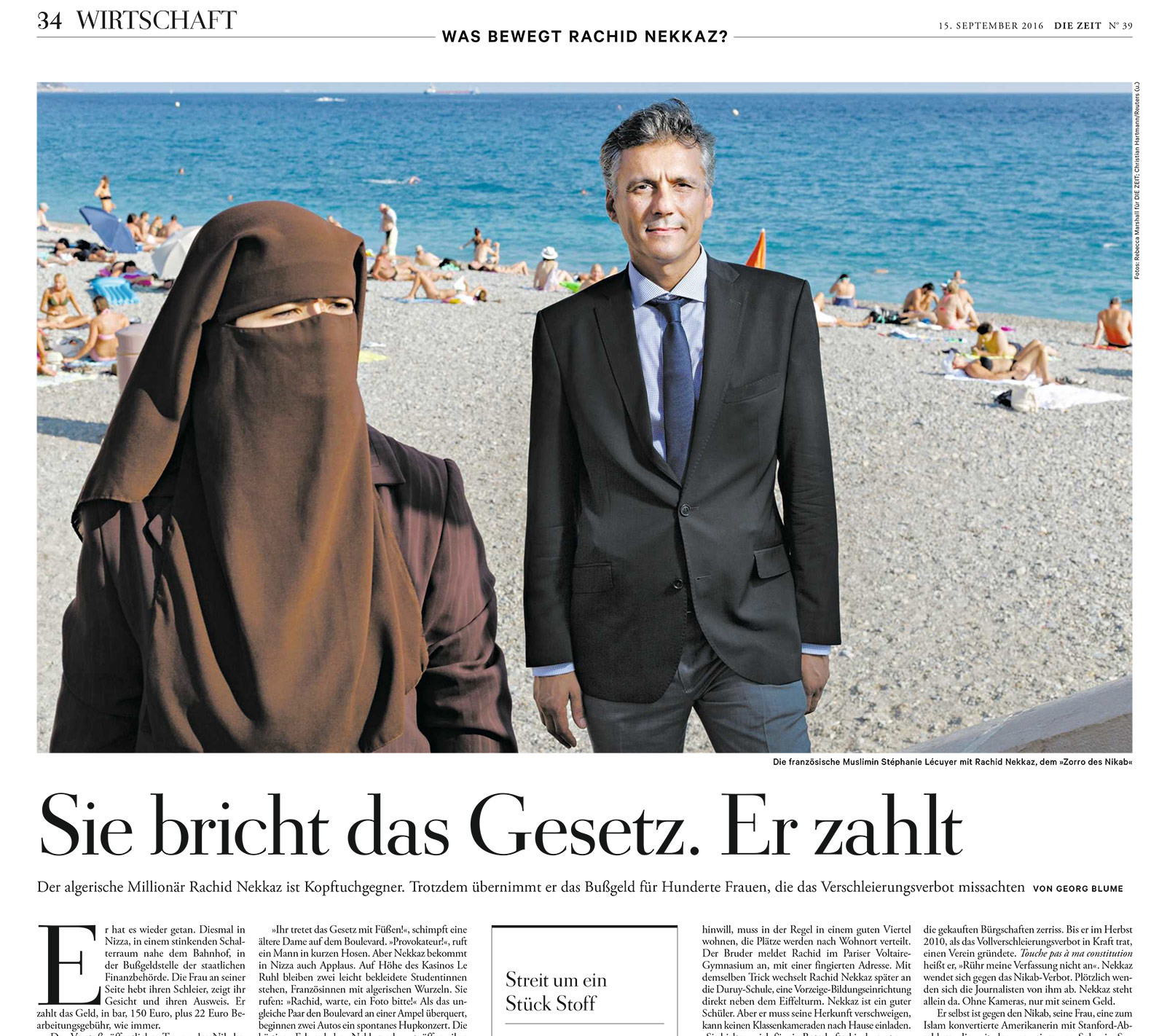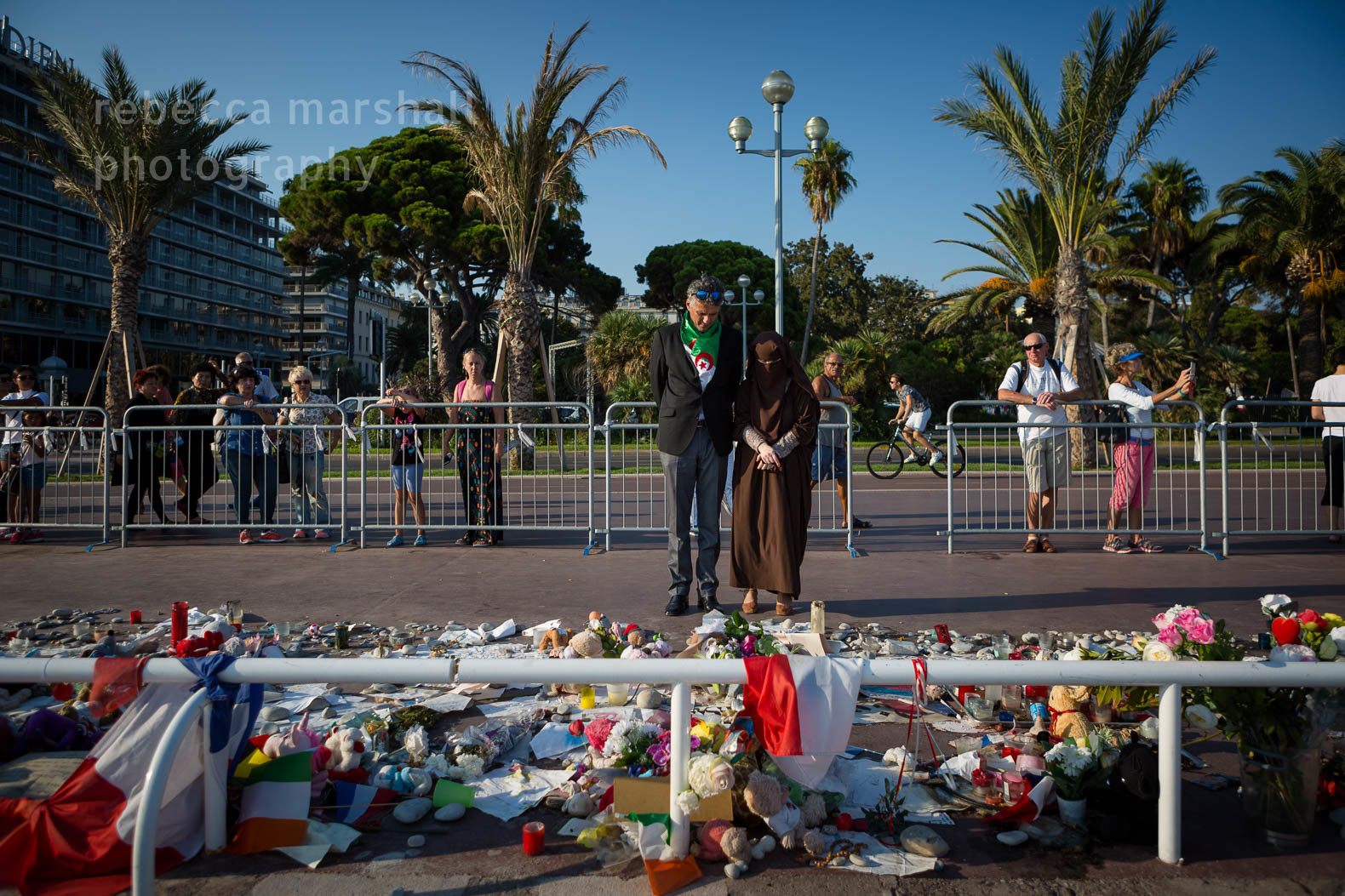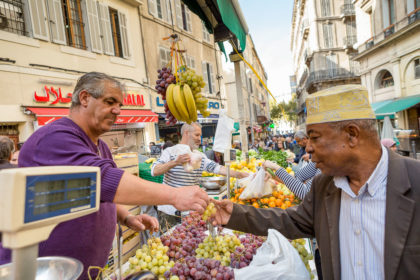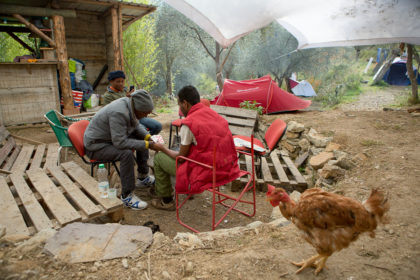Strutting down La Promenade des Anglais in Nice or La Croisette in Cannes, dressed to impress (or to deepen your suntan) and enjoying the frisson of being admired or admiring… ‘flâner‘ [the neat French word for this activity] is a favourite pastime in the South of France. It appears to be a pleasure that anyone can indulge in, regardless of age, means and looks. However, when I, as photographer, was assigned to spend the afternoon with a woman wearing a niqab, I learned that all is not as it appears. Strolling on the French Riviera is not always enjoyable and Nice, it turns out, looks rather different through a veil.
Hijab hero
Stéphanie doesn’t come into the category of being a submissive woman, forced to wear the veil by the dominant man / men in her life. The daughter of a Parisian policeman, she converted to Islam 20 years ago. Divorced, and without a father or husband on her case, she wears her veil by choice. She is currently unemployed and spends her time volunteering to assist disabled students at Nice university. The fact that she is applying to study law is somewhat ironic, since she is repeatedly breaking it.
Since Autumn 2010, when a ban on wearing the full Islamic face veil in public came into force in France, Stéphanie has accumulated no less than 46 fines for wearing her niqab. At 150 € a pop (+ a 22 € processing fee), an accumulation of such bills would be an intimidating prospect for an unemployed single mum to handle. But a knight in shining armour came to her aid: Algerian millionaire Rachid Nekkaz.
Rachid’s million euro fund stumps up the cash to pay any such fines on behalf of Muslim women across France. So far, he has settled the fines of over 580 women through his organisation ‘Touche pas à ma constitution‘ [‘hands off my constitution’], maintaining that this law is in direct opposition to the French constitution. While the mainstream French press appear reluctant to talk about him, Rachid has a high profile among the Algerian population, both at home and in France (some say he has aspirations to the Algerian presidency). In any case, his very public protest about the French ‘burqa ban’ has garnered international interest. A few weeks ago, Die Zeit writer Georg came to the South of France to meet this hijab-hero, and I was assigned to make a portrait of Rachid and Stéphanie. Together we chatted over coffee, ambled down La Promenade des Anglais and popped into the Nice treasury to pay Stéphanie’s latest fine.
An unsmiling French Riviera
As a photographer on the French Riviera, I’ve done my fair share of hopping on and off superyachts, walking along the seafront in Cannes next to stars and accompanying models and millionaires around the streets of Monaco and St Tropez. I’ve become used to the looks of delight and admiration in the faces of the crowds who gather around us, big happy smiles and camera phones pointed almost in my direction.
Yet the kind of attention I received at Stéphanie’s side was entirely different. The South of France is historically a stronghold for the country’s right and far-right political factions, and, recently shaken by the Bastille Day tragedy in Nice, it isn’t an especially veil-friendly place at the moment (as the recent burkini drama on the French Riviera illustrates). Wherever we went, passers-by stopped, turned and stared, and the stares were far from friendly. Dozens of eyes on cafe terraces, in car windows, at bus stops, were fixed in our direction. “Its like constantly walking in front of rows of machine-guns pointed at me” said Stéphanie. I overheard a constant stream of comments around us (“Will you just look at that? Unbelievable…” “The cheek of it”) and understood why she has taken to constantly listening to music on headphones to drown out the comments. However, headphones don’t drown out the elbows that have jabbed her in the ribs or the bucket of water thrown from a balcony…
Beach portrait anywhere but the beach
My photographer’s brief had been clear: Die Zeit asked for the portrait of Rachid and Stéphanie to be taken on Nice beach. However, as I steered them down towards the pebbles, Stéphanie stopped: “We’ll only have a couple of minutes before the police come and fine me, I guarantee it“. I looked at Rachid: he nodded his agreement. I hadn’t thought about the current political ‘hot-potato-ness’ of burqas on beaches and knew that we didn’t have time to indulge in half an hour of unwanted French administration. So I placed them on the steps for the portrait, held up plenty of beach-goers and gave a few more people reason to grumble.
Being a photographer with a portrait assignment on a beach is always tricky. Strong sunshine is generally a given on the French Riviera, blinding reflections are thrown everywhere by the sea and white pebbles and there is usually a lack of the shade I look for to stop people squinting and their skin shining in the sun. In this case, I proffered the pile of napkins I’d taken earlier from a café to take the shine off Rachid’s forehead (Stéphanie’s of course wasn’t an issue) and made cunning use of the shadow thrown by a flag flying on the Promenade for shade. Rachid was very gracious, constantly adjusting his position as the small flag moved around in the breeze and Georg rewarded my patience earlier sitting quietly through his interview, with a marvellous job acting as mobile lightstand for my flash and umbrella.
Paying respect on the promenade
Once the portrait had been taken, our final stop was to lay a bouquet of flowers on the Promenade des Anglais to remember the victims of Nice’s Bastille Day attack. This was the first time that Stéphanie had felt able to come to the memorial. Despite the reassuring company of Rachid, a photographer and a journalist, she was still clearly nervous. As we drew nearer to the fading mountain of flowers, teddy bears and messages, I could see why. People began to gather. While she bent to light a candle, I felt the static in the air. Over her silent prayers, I heard the murmur of outrage and fury around us at the “provocation” of a woman in a veil “daring to come here“.
Politics, feminism and views on religion or integration are always up for discussion. But for me, these opinions are irrelevant next to one simple truth: the importance of treating fellow human beings with respect. Stéphanie is a woman going about her daily life in Nice, experiencing the city’s highs and lows, and sharing in the simple baguette-buying or post-office-going activities that unite us all here. If she chooses to flout the burqa ban, what business is that of anyone else? She certainly doesn’t deserve, in my opinion, to experience regular hostility as soon as she steps outdoors in her home town.
Stéphanie’s head was bowed, and her already tiny, shrouded frame looked smaller still, as she walked away from the memorial. On the spur of the moment, I set my role as photographer aside and put my arms around her. She said nothing, and I couldn’t see her face, but as she leaned her head into my shoulder, her tears found a way out through the dark fabric of her niqab.
